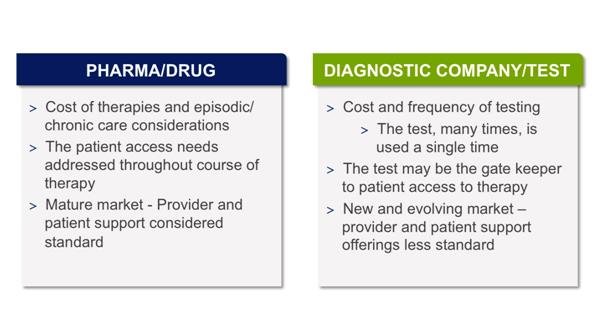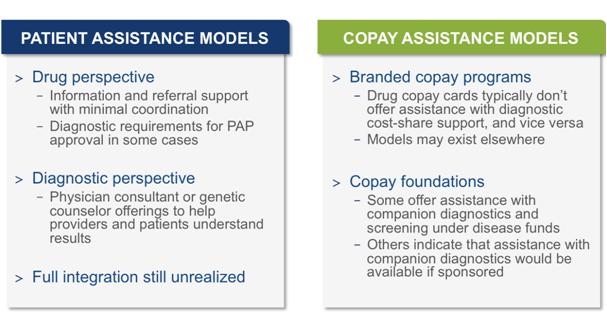Three key trends in evolving patient support services in the era of healthcare reform (part two)

In this second portion of a three-part series, Tracy Foster, President of Lash Group; and Stacie Heller, Vice President, Health Policy of Xcenda, discuss the cost of healthcare and the role personalized medicine and diagnostic procedures may play in delivering more cost-efficient, targeted treatment.
(Continued from "Evolving patient support services in the era of healthcare reform (part one)")
Part 2: Personalized medicine and diagnostics
A key pillar of healthcare reform is reducing the overall cost of care. Each year, the U.S. spends $300 billion on pharmaceuticals. With pressure from insurance companies to reduce spend on pharmaceutical products and unnecessary medical procedures, there is high demand for new technologies to better gauge risk for disease, better diagnose disease, and better measure disease progression and activity. With more than 2,000 diseases for which molecular diagnostic and genetic tests are available – and more than 300 new tests becoming available each year – novel diagnostics have the potential to significantly impact patient care and spending on therapies and medical procedures by giving physicians more insight into how to manage patients individually. Molecular diagnostic and genetic tests have the potential to provide substantial savings by helping physicians better target the right patient with the right dose of the right drug – and by detecting disease at its earliest stages to avoid costly adverse effects.
There is confusion, however, among physicians, patients and payers about which tests are clinically appropriate and how they should be covered. Some payers have detailed policies on covered tests, meaning that payers may need to be educated about new tests in order to determine their clinical value. Diagnostic tests required in the label of new therapies will likely be covered, but it's important to note that some products will have a companion diagnostic (CDx) specified in the label (for others, the use of CDx is simply recommended). Companion diagnostics are diagnostic tests that are linked to a particular drug / therapy, and are rapidly emerging as a key component in personalized medicine. Patients, however, may still be responsible for high out of pocket costs, and if they need to get more than one test, out of pocket expenses have the potential to become burdensome. As a result, provider offices will need to understand the specific requirements of each payer. Payers may require the use of specific reference laboratories, or the use of specific tests. Not using the laboratory or test specified by the payer may lead to denials for the drug, the need to repeat the test, and ultimately, increased out of pocket costs for the patient.

The market for companion diagnostics is gaining in popularity, amidst growing concerns around reducing healthcare costs and the increasing demand for effective medicines. The development of companion drugs and diagnostics has the potential to improve treatment outcomes, enhance patient compliance with prescriptions and eliminate the need for insurers to pay for expensive but ineffective therapies.

It will be important for manufacturers to expand managed market access strategies so payers are aware of the health outcomes and economic data to support the value proposition of their products. Modeling the cost impact and outcomes analysis of treatment modalities and looking at potential new payer contracting strategies is another key opportunity for manufacturers.
The next article in this series will be published on 26th July.
About the authors:
Stacie Heller
Vice President, Xcenda
Stacie Heller brings twenty years of experience to her role as Vice President of Xcenda's Health Policy consulting practice. Based in Washington DC, Heller leads a team of consultants from across the country who develop reimbursement launch strategies and guide clients through complex decisions related to coverage, coding, compendia, health policy / healthcare reform implementation, and the design of patient and provider support services.
Heller has in-depth knowledge of healthcare reform implementation, including guidelines on Accountable Care Organizations. As the editor of Health Policy Weekly, a complimentary e-publication, Heller keeps clients and stakeholders informed on the latest legislative and regulatory updates. Heller and her team track and analyze congressional and regulatory health policy and provide manufacturers and other stakeholders with ongoing strategic guidance, proactive updates, analysis and policy briefs related to issues affecting the healthcare industry.
Heller's expertise encompasses a wide range of public payers and includes developing reimbursement strategies for new products and addressing reimbursement obstacles for existing therapies. Previously, Heller directed the operational management of the reimbursement-based patient assistance programs for HIV / AIDS therapies at the Lash Group. Before joining the Specialty Group,Heller monitored physician-related reimbursement issues for the American Society of Internal Medicine, now part of the American College of Physicians (ACP). Heller received a B.A. in public policy from Pennsylvania State University.
Tracy Foster, MBA
President, Lash Group
As President of Lash Group, Tracy Ott Foster contributes her expertise, strategy and experience to a company known for its unique patient and provider support programs. For over 20 years, Lash Group has designed, developed and implemented innovative programs within the pharmaceutical, biotech and medical device industries, creating solutions that help patients begin therapy in a timely manner while maximizing their ongoing continuity of care.
Under Foster's executive leadership, Lash Group provides industry-leading access services from reimbursement strategy and support to copay and patient assistance solutions, and adherence and other clinical case management support services. Through these personalized and scalable support services, Lash Group enhances speed-to-therapy, promotes increased adherence and delivers actionable data to their partners. As part of AmerisourceBergen Consulting Services, Lash Group works to serve manufacturers with reimbursement services, patient advocacy programs, health outcomes and pharmacoeconomic consulting, advisory boards and payer-related analytics.
A respected speaker and insightful author of numerous trade articles, Foster's influence on the pharmaceutical industry has spanned over 15 years. Her regular nationwide speaking engagements provide insights and strategic guidance on pertinent industry issues including product support programs, patient access, reimbursement policy and trends. Strategic planning, thought leadership and specialty pharmaceuticals continue to be passions for Foster, whose dedication and enthusiasm earned her accolades from the Charlotte Business Journal with a Top 25 Women in Business Achievement Award as well as a 40 under 40 Award.
What role will personalized medicine have in the delivery of cost-efficient treatments?











